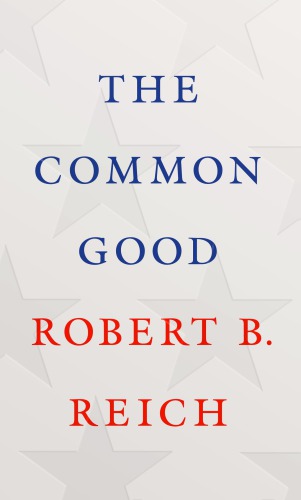
The Common Good
کتاب های مرتبط
- اطلاعات
- نقد و بررسی
- دیدگاه کاربران
نقد و بررسی

March 1, 2018
Former U.S. secretary of labor (1993-97) Reich (Chancellor's Professor of Public Policy, Univ. of California, Berkeley; Saving Capitalism) examines what he sees as a divided America. His takeoff point is the call made 50 years ago by President John F. Kennedy for Americans to contribute individually for the common good. Reich despairs that instead Americans have become increasingly selfish. He harshly criticizes the freebooting of CEOs, the self-first philosophy of Ayn Rand, and the divisive presidency of Donald Trump. He chronicles societal changes that he says have resulted in national disunity, distrust, and hopelessness. Reich concludes that pulling together as a society is the only strategy for longterm mutual prosperity and that leaders must act as trustees for the common good. That those who do the right thing should be honored, and those who gain by underhanded means shamed, that fact-based truth must be demanded, and citizens must be both educated and engaged. VERDICT Very timely with discussion of the sexual harassment scandal in Hollywood and NFL kneeling protests, Reich's work is an important call for reform that should appeal to a wide audience disaffected with the status quo.--Lawrence Maxted, Gannon Univ. Lib., Erie, PA
Copyright 2018 Library Journal, LLC Used with permission.

February 1, 2018
Reich (Public Policy/Univ. of California; Saving Capitalism, 2015, etc.) takes a note from Adam Smith and runs with it in this spirited defense of the public sphere.The best economy may be one in which unrestrained trade occurs in keeping with the laws of supply and demand, but it is also one in which human needs are met and externalities such as environmental costs are taken into account. In this new gilded age, writes the author, the common good is often ignored, even if a few interesting things are happening. For one thing, Donald Trump "has at least brought us back to first principles....Trump has got us talking about democracy versus tyranny." The president and his ilk have also gotten us talking about whether there is such a thing as a social contract or a public domain after all. In this brief but well-argued treatise, Reich contrasts shareholder and stakeholder capitalism, the excesses of the former often explained away by the notion that the executive has a fiduciary obligation to increase returns to shareholders no matter what the cost. "The argument is tautological," writes the author. "It assumes that investors are the only people worthy of consideration. What about the common good?" The enemies of the common good are countless, from latter-day slumlords to deregulated megabanks and untrammeled hedge funds, all of which disregard the rules society has evolved to keep transactions fair, "tacit rules that can be exploited by people who view them as opportunities for selfish gain rather than as social constraints." Reich examines the rise of ruleless society as a function of declining trust in social institutions. Against all this, among other things--and now borrowing a page from Sandra Day O'Connor--the author urges a renewal of civic education to enable people "to work with others to separate facts and logic from values and beliefs," including, one assumes, the belief that it is acceptable to rob the public blind.Idealistic and stronger in description than prescription, but a provocative essay nonetheless.
COPYRIGHT(2018) Kirkus Reviews, ALL RIGHTS RESERVED.

March 19, 2018
Americans have gotten into the habit of looking out for number one at an overall cost to economic and political well-being, argues professor and former labor secretary Reich (Saving Capitalism) in this disquieting meditation. He believes Americans have lost their sense of connectedness, to one another and to larger ideals, leading to political self-destruction in the form of the Trump administration. As to the question of how this all happened, Reich sees Americans as having fallen prey to a whatever-it-takes mentality—whether applied to winning elections, maximizing profits, or rigging the economy. As a remedy, Reich urges a return to the historical ideal of a shared, common good. Most people, he points out, are set up for some degree of cooperation and compassion. Yet society has ended up with self-interested disaster artists such as Martin Shkreli, a former hedge fund manager recently convicted of fraud, who embody the steady erosion of a civic trust Reich sees being fully dismantled by President Trump. This manifesto is geared more toward describing the problem—if there is no common good, Reich points out, there is no society—than resolving it. When Reich asks whether the common good can be restored, he seems genuinely unsure, though he urges his audience to try. Clear-voiced and accessible, this is a provocative look at where the U.S. has failed, if not quite a map to future success.

February 1, 2018
Reich (Saving Capitalism, 2015)a former secretary of labor, professor of public policy, and lucid and prolific author of consciencegauges the deterioration of our understanding of and commitment to the common good in spite of the fact that our shared principles and civic interconnectivity comprise the very fabric of society. Truth itself is a common good, Reich asserts, as is public education, which should prepare us for informed participation in our democracy. He quotes Jefferson: Ignorance and despotism seem made for each other. We also need a robust free press to hold our government responsible. These and every other facet of the common good are now imperiled under whatever-it-takes-to-win politics and business, which have fused via the massive influx of corporate money into Washington. Trump in the White House, he argues, is the culmination of the suppression of civic values by celebrity, lies, greed, the abuse of power, and the stoking of fear and anger. Reich's lucidly defining and empowering call for revitalized civic awarenesscomplete with an enticing list of recommended reading and discussion guideis an ideal catalyst for book-group conversations.(Reprinted with permission of Booklist, copyright 2018, American Library Association.)

























دیدگاه کاربران